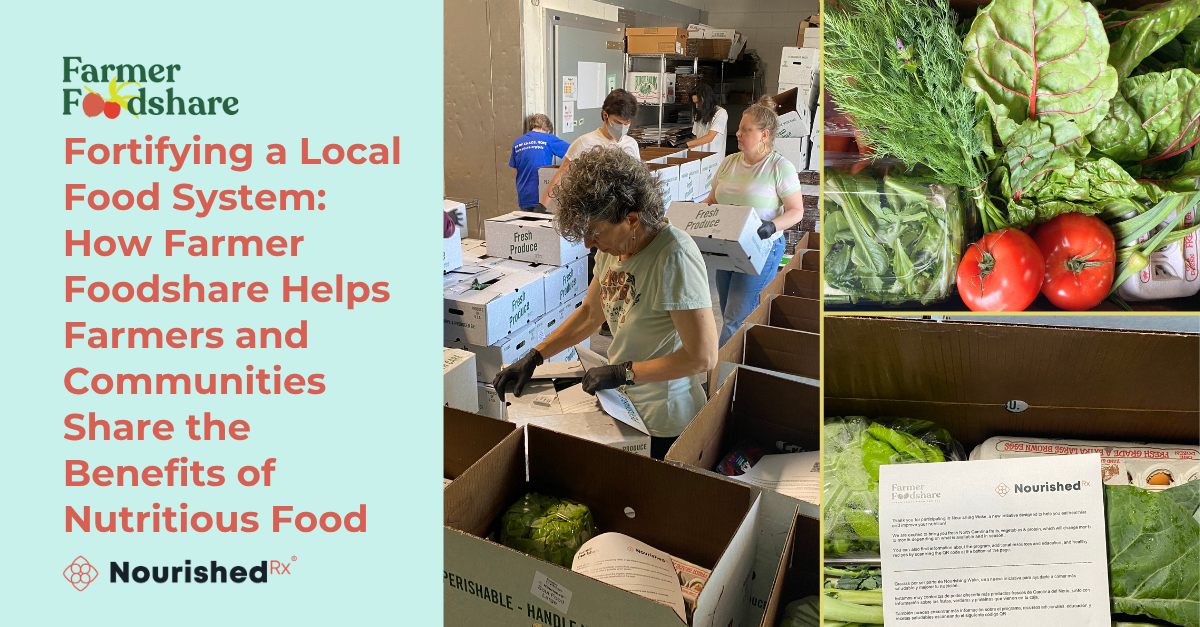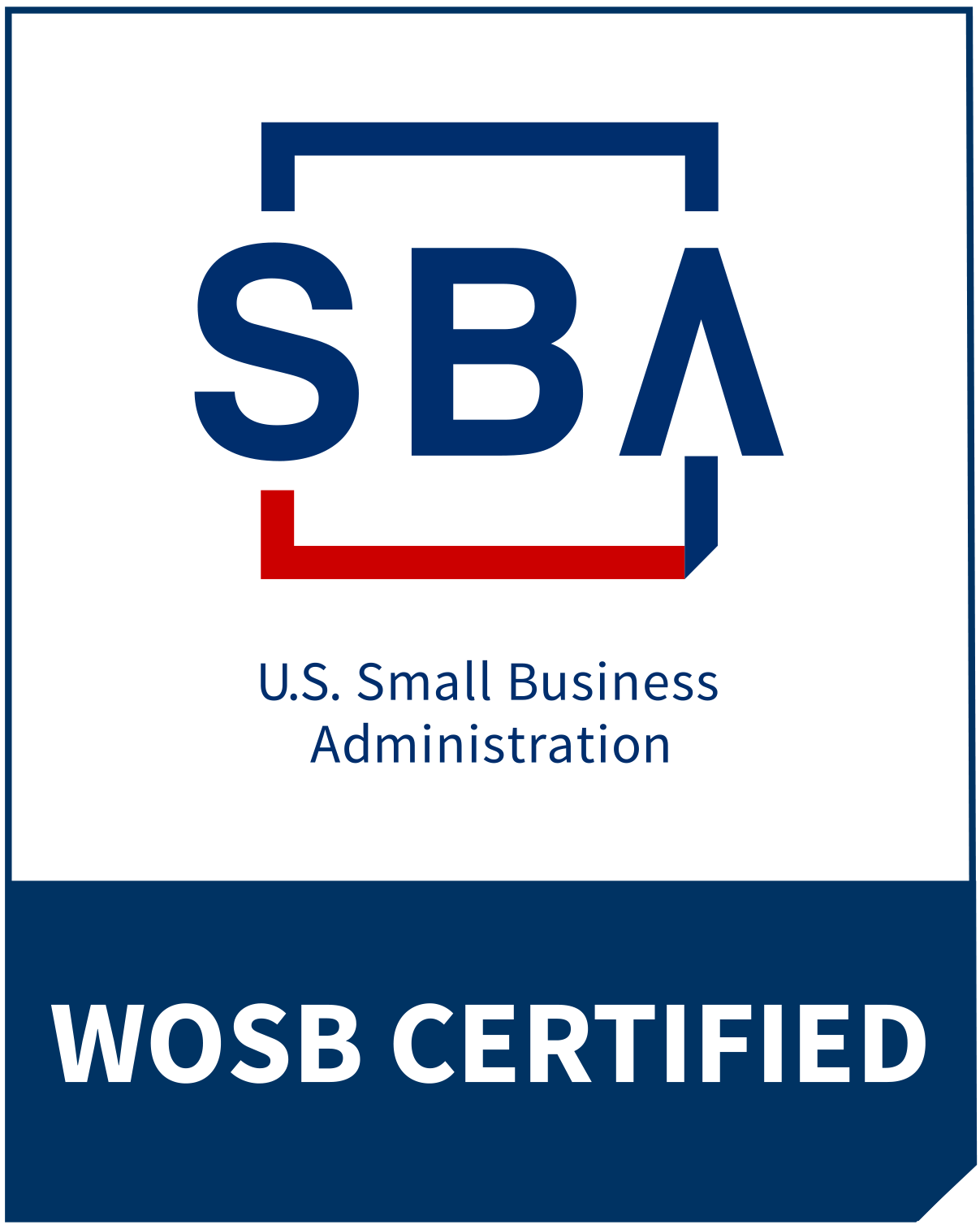Fortifying a Local Food System: How Farmer Foodshare Helps Farmers and Communities Share the Benefits of Nutritious Food
“Our organization is really dedicated to developing a healthy, equitable food system where local farmers thrive and everyone has enough good food to eat,” says Hillary Bruce, the development director at Farmer Foodshare, a North Carolina-based food hub organization working to remove barriers to growing and accessing local food, with community wellbeing at its core.
Recently, NourishedRx experienced that mission-driven dedication first-hand when we launched a new partnership with Farmer Foodshare to develop and launch Nourishing Wake, a groundbreaking Food is Health initiative in Wake County, North Carolina.
Food is Health programs not only help meet the needs of people with food insecurity and chronic illness—they also support a healthier food system and strengthen communities. That kind of broad-reaching impact can’t be created or sustained by one organization or agency alone, however. Farmer Foodshare’s mission-driven efforts show what innovative systems, community involvement, and good-old-fashioned people power can accomplish.
Here’s the story of Farmer Foodshare and our partnership in Nourishing Wake.
Farmer Foodshare: Sourcing Fresh, Local Food for All
Farmer Foodshare started in 2010 at the Carrboro Farmers’ Market in Carrboro, North Carolina. Everything sold at the market must be grown or produced within a 50-mile radius, making it an important hub for local farmers. One of the founders of Farmers Foodshare, Margaret Gifford, noticed that a great deal of fresh produce went unsold each week. Margaret wondered where that produce ended up and if there was a way to make use of this overabundance of food to help the many local residents experiencing hunger and malnourishment. That thought sparked a movement rooted in social justice, and Farmer Foodshare was born.
At first, Farmer Foodshare set up donation stations at local markets where consumers could donate extra food they bought from farmers and where farmers could bring any unsold produce from the day. The concept quickly took off, enabling Farmer Foodshare to grow its network of farmers and community organizations across the state. It also helped convince local agencies that had been buying food from big retailers to use those funds locally by instead procuring from Farmer Foodshare.
The key to sustained success has been finding ways to support local farmers economically. As Hillary says, “We pride ourselves on always paying farmers for the produce we purchase and making sure they’re receiving competitive compensation so their work continues to be sustainable. We’re here to support them and people in need.”
Over 90% of the 200 farmers in the Farmer Foodshare network are small- to mid-sized farms, and almost 90% are new to farming, woman-owned, or BIPOC-owned. This support for farmers who have been traditionally marginalized is changing the face of farming in North Carolina and making the local food system more equitable.
Today, Farmer Foodshare reaches consumers of all income levels in support of its social justice mission. Half of all food purchases go to institutional customers—from public school districts and university dining halls to small restaurants and caterers. The other half fuels the emergency food system. To that end, Farmer Foodshare works with 30 local community partner agencies to support individuals experiencing food insecurity.
Much of the funding for those purchases comes from grants, individual supporters, or agencies that contact Farmer Foodshare with a budget to purchase food for people in need. Farmer Foodshare is also the fiscal agent for the Triangle Area Double Bucks program, a SNAP matching program operating at local farmers’ markets.
Connecting supply to need is complicated but rewarding. “We have a small but mighty staff who do a lot of back-and-forth coordination between farmers and customers,” Hilary says. Customers will request a particular variety of produce, and Farmers Foodshare will reach out to its network of farmers to source that supply. Likewise, farmers might get in touch if they have an excess of produce they’d like to sell.
In this way, Farmer Foodshare has helped create a vibrant community. As Elizabeth Figgie, Farmer Foodshare’s communications and marketing manager, says, “I love unearthing these stores and connecting all the different subcommunities within our food system. It's a really special thing to bring our farmers closer to eaters and local businesses.”
A Community-Driven Approach to Food is Health
In 2025, Wake County took a bold step in the fight against food insecurity and chronic disease with the launch of Nourishing Wake, an ARPA-funded, locally sourced Produce Prescription Program. Wake County enlisted NourishedRx for help. We knew this was not a simple project because food insecurity and chronic disease are often connected to barriers to food access rooted in the local food system.
Wake County illustrates that conundrum all too well. As part of the famed Research Triangle in North Carolina, the county has experienced rapid population growth over the past decade, straining social resources. During that population boom, Wake County lost nearly 20% of its farm and forest land, which has negatively impacted the welfare of local farmers and impeded community access to fresh, affordable food, which is compounded by the rising cost of living in the area. This has been particularly hard on the growing number of people with chronic illness, many of whom are uninsured or underinsured and face transportation barriers that make it difficult to get the care and nutritious food they need to improve their health and quality of life.
Nourishing Wake integrates local food systems with local healthcare initiatives to help vulnerable residents with chronic illness receive home-delivered, culturally tailored, fresh produce and proteins. Still in its early days, this initiative is already proving the transformative power of Food is Health on community health and local agriculture.
Nourishing Wake intends to serve 1,000 households across Wake County. It’s a true collaboration across many organizations, community partners, and individuals: Wake County provides eligibility criteria for the program. Federally Qualified Health Clinics (FQHCs) identify and refer eligible participants. NourishedRx administers the program and serves as the technology platform, overseeing enrollment, engagement, reporting, and coordination. And Farmer Foodshare sources the produce and proteins to feed those participants while prioritizing historically marginalized producers.
Participants get twice-monthly home deliveries of fresh, culturally tailored produce and proteins that celebrate North Carolina agriculture, African American Southern cuisine, and Hispanic food traditions. When working with wholesale customers, Farmer Foodshare has to source each variety of produce from the same farm. But the Nourishing Wake program is unique. Boxes of similar produce can come from different farms, which gives Farmer Foodshare more flexibility in supporting a variety of smaller farms.
A Sustainable, Scalable Model for Communities Everywhere
Nourishing Wake is more than just a short-term solution—it’s a model for the future of healthcare-integrated food security. To ensure long-term sustainability, a third-party evaluator will track the effectiveness of the initiative, including measurable health and economic outcomes. That data will be used to improve impact over time, as well as replicability and scalability.
Together, NourishedRx, Farmer Foodshare, and Wake County are demonstrating the power of Food is Health, offering a transformative approach that can serve as a national model for integrating nutrition into healthcare while driving food security and supporting local farms.
The most concrete goals of the program are to reduce food insecurity and improve dietary health for vulnerable populations while also supporting local farmers and historically marginalized producers. But the anecdotal impact has already been incredibly exciting.
“We weren't sure how many folks would be referred to the program initially,” Hillary says, “and we know that a lot of pilot programs can start slowly until people buy into them. But FQHC physicians have been referring patients from the get-go, and those patients have been enrolling right away. That speaks to the enormous need and interest in the community.”
Community impact is the goal and the reward. As Elizabeth observes, “At Farmer Foodshare, we use a lot of ‘we’ language, a lot of ‘together’ language. And that's really genuine. It’s not just our small team who are feeding the food insecure populations of North Carolina—it's also the farmers, food institutions, and volunteers we work with every week.”
At NourishedRx, we couldn’t agree more.






